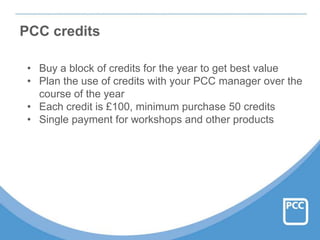CCG support presentation
- 1. CCG support programme Tailored practical support for CCGs and their members from the national experts
- 2. Our credentials • PCC has a track record of support to the NHS through major periods of change • PCC is a not-for-profit business whose social mission is to deliver benefit to the NHS • PCC focuses on primary care performance and improvement, enabling optimum outcomes for patients with emphasis on prevention and out-of-hospital care • We understand the relationship between primary care and the rest of the system and identify the levers for achieving improvement and transformational change.
- 3. 3. Facilitated development 4. Bespoke support 2. Member engagement and development 1. Team development Developing and enhancing the knowledge and skills of CCG teams Supporting development and involvement of CCG members Helping CCGs develop relation- ships and commissioning plans Tailored support for local programmes
- 5. Debbie Robinson, head of primary care quality and improvement, Calderdale CCG “Right from the start, PCC impressed us with your team’s efficient, professional manner - an approach that not only inspired confidence, but helped us generate the results we were looking for. The quality of service offered by your organisation was inspiring.”
- 6. 1. Team development Developing and enhancing the knowledge and skills of CCG teams
- 7. A continually evolving programme to support development of CCG staff in their new roles • Using the NHS standard contract and e-contract • Commissioning for outcomes • Lean commissioning • Procurement • Negotiation training • Facilitation training • Personal and organisational development
- 8. 2. Member engagement and development Supporting development and involvement of CCG members
- 9. Primary care development Successful CCGs will have successful members. Without the development of primary care how will CCGs enable the changes needed?
- 10. Awareness and development for CCG member practices • Surviving the NHS changes • Developing as commissioners • Procurement • Understanding the NHS standard contract • Working together
- 11. Working together…sharing resources Clinical servicesOutsourcing Development Joint provision
- 12. Dr Roy Williams, chair, Wyre Forest GP Association “The workshop really helped us understand how we can work together and develop a plan to make it happen” The workshop was “very helpful in allowing us to express our ideas and helping organise our thoughts and actions.” Julie Mackinzie, practice manager, Isle of Wight
- 13. 3. Facilitated development Helping develop relationships and commissioning plans
- 14. Informed facilitation to enable progress • Developing a primary care strategy • Implementing a strategy • Engaging with stakeholders • Relationships with LMCs, area teams, members • Locality based strategic development
- 15. Working together…primary care strategy ?
- 16. Dr Richard Bull, clinical lead, North Derbyshire CCG “The workshop really lit the blue touch paper” “Lots of food for thought” Karen Fletcher, locality business manager, Ivel Valley locality, Bedfordshire CCG
- 17. 4. Bespoke support Tailored support for local programmes
- 18. Tailored solutions to your needs • Management support • Project support • Patient engagement and participation • Relationship management
- 19. Find out more www.pcc-cic.org.uk peter.bullivant@pcc.nhs.uk or 07717 300633 phillip.stimpson@pcc.nhs.uk or 07557 938947
Editor's Notes
- Can practices work together to be more effective and efficient? YesThe practices need to think how they can best work together.Do they need to keep their individual identity?Important that practices have clear shared agreement of purpose and aims of working together
- CCGs should be working with their practices to design the new services to make the transformational change. What services do they need outside of their core services to effect the strategic aims. PCC can provide



















